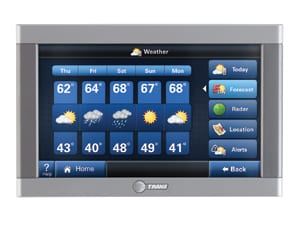 Service technicians may soon be taking calls not from central dispatch, but from broken appliances themselves. Manufacturers rolled out a slew of smart gadgets at the Consumer Electronics Show in Las Vegas that have intriguing potential to HVAC and other service businesses. From refrigerators that directly contact customer service with repair instructions to the weather-detecting Trane ComfortLink II Thermostat, the CES Best of Innovations 2011 Award Honoree and winner of the Popular Mechanics 2010 Breakthrough Award, home appliances are taking on a life of their own, one guaranteed to transform the face of both clean tech and the field service industry.
Service technicians may soon be taking calls not from central dispatch, but from broken appliances themselves. Manufacturers rolled out a slew of smart gadgets at the Consumer Electronics Show in Las Vegas that have intriguing potential to HVAC and other service businesses. From refrigerators that directly contact customer service with repair instructions to the weather-detecting Trane ComfortLink II Thermostat, the CES Best of Innovations 2011 Award Honoree and winner of the Popular Mechanics 2010 Breakthrough Award, home appliances are taking on a life of their own, one guaranteed to transform the face of both clean tech and the field service industry.
Among the most interesting to the HVAC and service sectors are an array of smart (although not necessarily “energy efficient”) appliances from LG, writes industry insider Mike Dauber, vice president of Battery Ventures and co-author of the firm’s Clean Makes Green blog.
“The futuristic appliances that we have all perpetually heard discussed for years – internet connected, “smart” appliances – are finally here. Each of the appliances boasted some degree of reduced energy consumption. All of the appliances also have WiFi connectivity which benefits each appliance in unique ways. The refrigerator, for instance, has a “food management system” (a system!) that can tell you when your milk is past its expiration date. All of the appliances can self diagnose via a phone/tablet app, and they can even directly contact customer service with repair instructions.”
Many appliances boast smart grid capabilities, running at the cheapest possible time and tracking energy usage to save the owner money.
“I suspect that this is overkill for most consumers today … that said, variable pricing schemes are going to become increasingly more common, and owning appliances that can intelligently select cheaper hours of operation will be extremely useful.”
And while the hefty price tags attached to some of these smart appliances will continue to be a hurdle for many homeowners, the demand for energy efficiency should eventually drive cost down, Dauber predicts.

Share this: